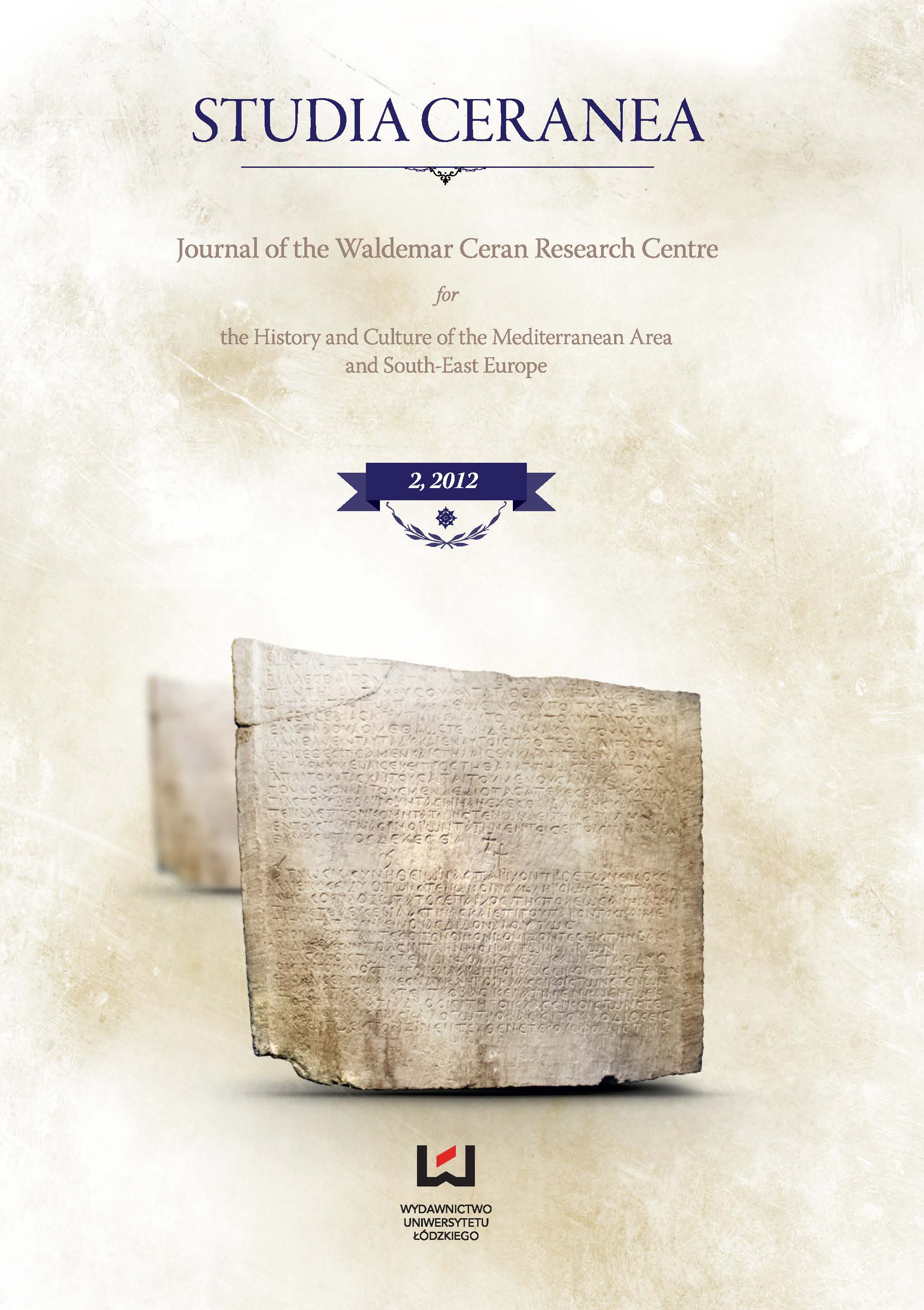St. Symeon the New Theologian and Western Dissident Movements
DOI:
https://doi.org/10.18778/2084-140X.02.12Abstract
The trial at Orleans in 1022 of a group of aristocratic clergy, who included the confessor of Queen Constance of France, and their followers on the charge of heresy is the most fully reported among the group of heresy trials which were conducted in the Western Church during the first half of the eleventh century. Although the alleged heretics of Orleans are usually considered a part of a wider pattern of Western religious dissent, the charges brought against them differ considerably from those levelled against the other groups brought to trial in that period. The heterodox beliefs with which the canons of Orleans were charged bear a strong resemblance to the teachings of the Byzantine abbot, St. Symeon the New Theologian, who died in 1022. St. Symeon taught that it was possible for a Christian to experience the vision of God in this life if he or she received ascetic guidance from a spiritual director, who need not be a priest. In the late tenth and early eleventh centuries a significant number of Orthodox monks visited northern Europe, including Orleans, and some of them settled there. It is therefore possible that the Canons of Orleans who were put on trial had been trained in the tradition of St. Symeon by one of those Orthodox monks who were familiar with it. St. Symeon was part of the Hesychast tradition in the Byzantine Church. Even so, his emphasis on the supremacy of personal religious experience at the expense of the corporate worship of the institutional Church was strongly criticised by some of his contemporaries. A study of his writings shows that he was, in fact, completely Orthodox in faith and practice and that these criticisms were ill-judged. Nevertheless, if, as we have suggested, the Canons of Orleans had tried to live in accordance with his teachings, the hostile reactions of the Western hierarchy would be comprehensible. For there was no tradition of Hesychasm in the spirituality of the Western Church, and the fact that the dissidents at Orleans saw little value in observing the rituals of the established Church would have alarmed conventional churchmen.
Downloads
References
Bautier R-H., L’hérésie d’Orléans et le mouvement intellectuel au début du XIe siècle. Documents et hypothèses,[in:] Actes du 95e Congrès national des sociétés savantes, Section philologique et historique, vol. I, Enseignement et vie intellectuelle (IXe–XVIe siècle), Paris 1975, p. 63–88.
Google Scholar
Andre de Fleury, Vie de Gauzlin, abbé de Fleury, ed. et trans. R-H. de Bautier and G. Labory, Paris 1969.
Google Scholar
Monasterii Sancti Petri Carnotensis Codex Diplomaticus, pars I, Quae dicitur Vetus Aganon, col. 111, [in:] Collection des documents inédits sur l’histoire de France, Collection des Cartulaires de France, ed. M. Guerard, vol. I, Paris 1840, p. 109–115.
Google Scholar
Rodulfi Glabri Historiarum Libri Quinque, III, 8, 26–31, [in:] Rodulfus Glaber, Opera, ed. J. France, N. Bulst, P. Reynolds, Oxford 1989, p. 138–150.
Google Scholar
Gesta Synodi Aurelianensis, ed. M. Bouquet et al., [in:] Recueil des historiens des Gaules et de la France, vol. X, Paris 1760.
Google Scholar
Adhemar, Chronique, col. 59, ed. J. Chavanon, Paris 1897.
Google Scholar
Landes R., Relics, Apocalypse and the deceits of history: Adhémar of Chabannes, 989–1034, Cambridge Mass. 1995.
Google Scholar
Fulbert of Chartres, Epistolae, V, col. 106–204, [in:] Patrologiae cursus completus. Series latina, ed. J.-P. Migne, 1844–1880.
Google Scholar
Un grand mystique byzantine. Vie de Syméon le Nouveau Theologien (949–1022) par Nicetas Stéthatos, ed. et trans. I. Hausherr, G. Horn, Rome 1928.
Google Scholar
Hussey J.M., The Orthodox Church in the Byzantine Empire, Oxford 1985.
Google Scholar
Symeon le Nouveau Theologien, Catéchèses, ed. Krivocheine B., trans. S. Paramelle, vol. II, Paris 1964.
Google Scholar
Symeon le Nouveau Theologien, Traités theologiques et éthiques, ed. et trans. J. Darrouzes, vol. II, Paris 1967.
Google Scholar
Krivocheine B., In the light of Christ. St. Symeon the New Theologian (949–1022): Life – Spirituality – Doctrine, trans. A.P. Gythiel, Crestwood–New York 1986.
Google Scholar
Symeon le Nouveau Theologien, Hymnes, ed. J. Koder, trans. L. Neyrand, vol. II, Paris 1971.
Google Scholar
Euthymius Zigabenus, Against the Bogomils, col. 16, [in:] Christian Dualist Heresies in the Byzantine World, c. 650 – c. 1450, trans. J. Hamilton, B. Hamilton, Manchester 1998.
Google Scholar
Rituel cathare, ed. C. Thouzellier, Paris 1976.
Google Scholar
Lambert M., Medieval Heresy: Popular movements from Bogomil to Hus, London 1977.
Google Scholar
Angold M., Church and society in Byzantium under the Comneni, 1081–1261, Cambridge 1995.
Google Scholar
Magdalino P., The empire of Manuel I Komnenos, 1143–1180, Cambridge 1993.
Google Scholar
Turner H.J.M., St. Symeon the New Theologian and dualist heresies-comparisons and contrasts, „St. Vladimir’s Theological Quarterly” 32, 1988.
Google Scholar
Copleston F.C., Aquinas, Harmondsworth 1955.
Google Scholar
Fonti per la storia d’Italia, vol. XCIV, ed. G. Tabacco, Roma 1957.
Google Scholar
Hamilton B., McNulty P.A., Orientale lumen et magistra latinitas: Greek influences on Western monasticism (900–1000), [in:] Le millénaire du Mont Athos, 963–1963, Études et mélanges, Chevetogne 1963, vol. I, p. 181–216.
Google Scholar
Wolff R.L., How the good news was brought from Byzantium to Angoulęme; or the pursuit of a hare in an ox-cart, „Byzantine and Modern Greek Studies” 4, 1979, p. 139–189.
Google Scholar
De S. Gregorio Episcopo Armeno Pitiveri in Gallia, col. XI, Acta sanctorum, vol. I–LXIII, Paris 1863–1940, Martii 11, Antwerp 1668.
Google Scholar
Head T., Hagiography and the cult of saints. The diocese of Orleans, 800–1200, Cambridge 1990.
Google Scholar
Ebersolt J., Orient et Occident. Recherches sur les influences byzantines et orientales en France avant et pendant les croisades, Paris 1954.
Google Scholar
Downloads
Published
How to Cite
Issue
Section
License

This work is licensed under a Creative Commons Attribution-NonCommercial-NoDerivatives 4.0 International License.














